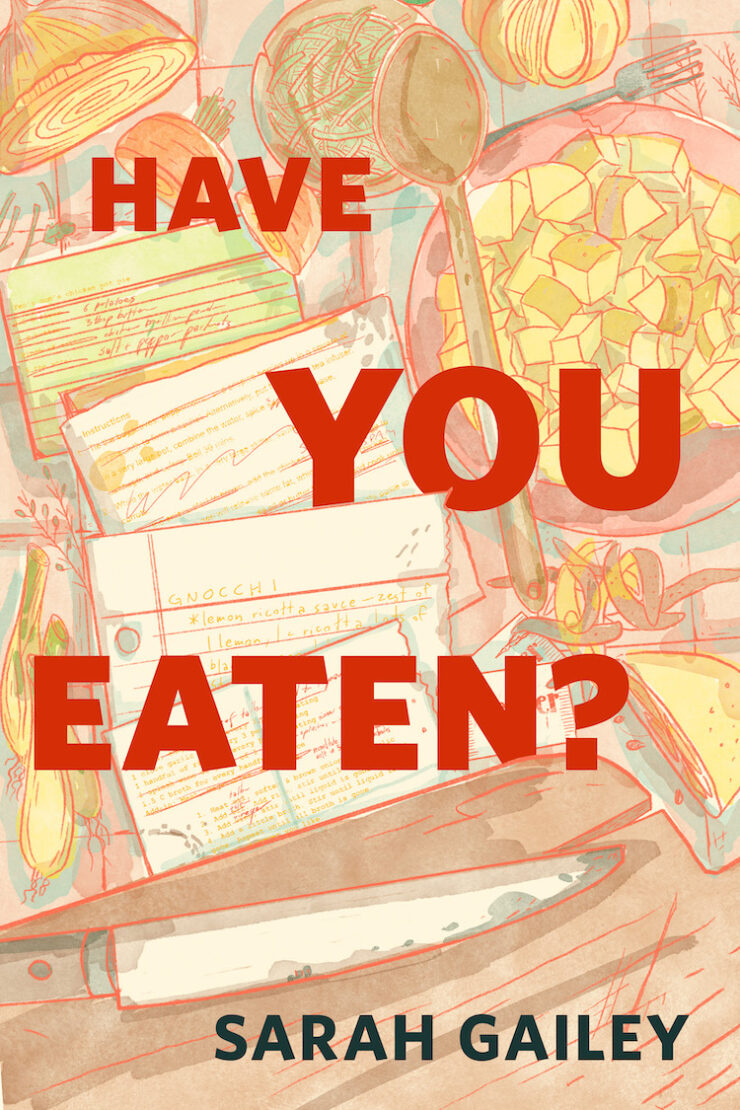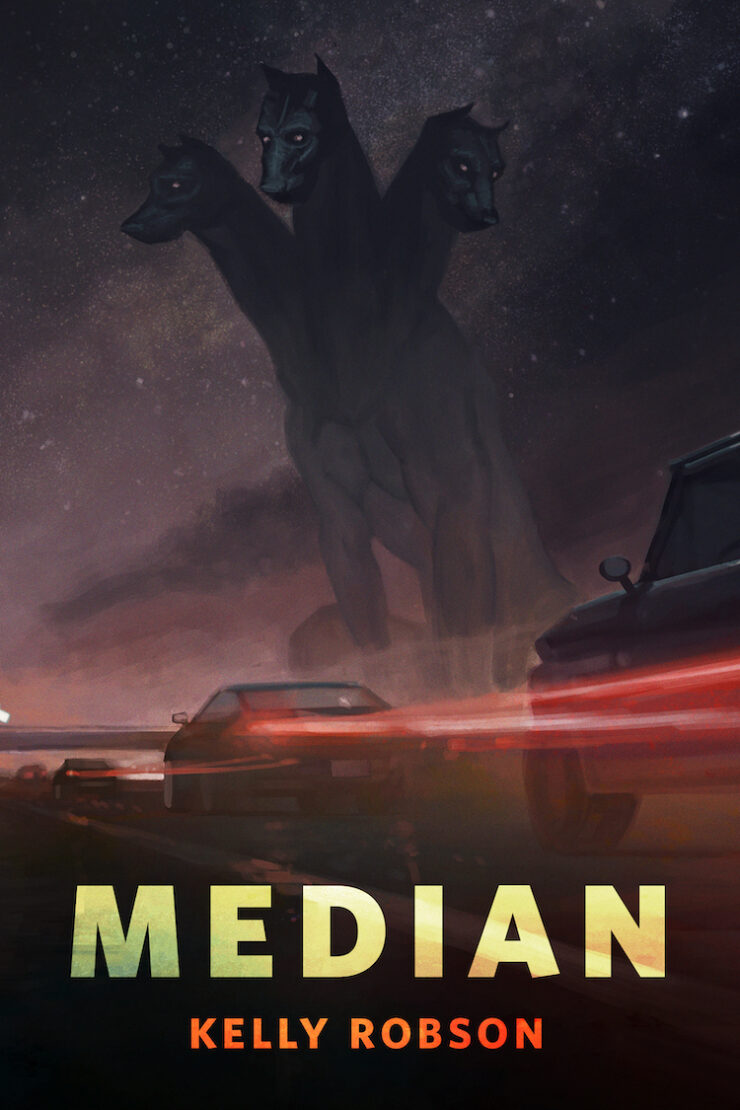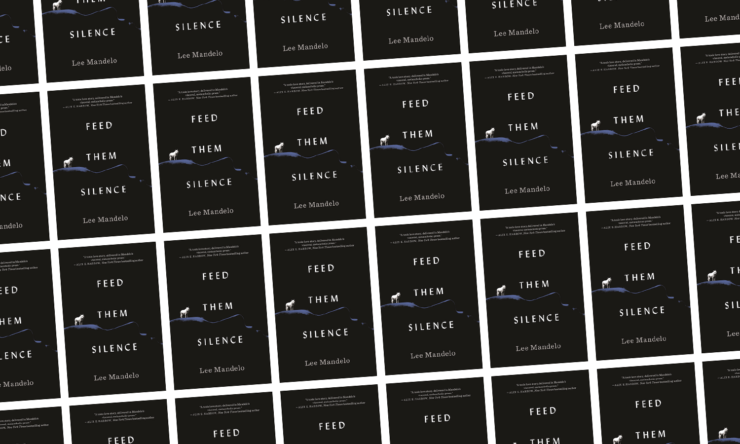Queerness often begins with yearning, and in Feed Them Silence, that yearning grows teeth. Many of us come to know our queerness first as a dissonance, between who we are and who we are expected to be, what we are expected to want. It haunts, the version of oneself and one’s life out of reach. With his debut novel Summer Sons, Lee Mandelo established himself an expert at excavating the ferocity of that dissonance. He approaches it from a different angle here, fresh and just as intoxicating to read. Yearning turned obsessive and, literally, encompassing. The result is a masterpiece of a novella. Mandelo delivers a style fittingly sparer than the sensory Summer Sons, no less textured, rigorously imagined, and triumphantly executed.
While Summer Sons deals with the repression and realization of that queer desire, Feed Them Silence explores a different manifestation of this sort of hunger. What happens when that charged, writhing chimera of desire manifests within someone who, ostensibly, has had such iddy wants long-past fulfilled? Whose curiosities and longings are meant to fit within the expected, documented constraints of the marriage she’s signed up for, the scientific pursuits that will best satisfy venture capitalist investors looking to commercialize? In other words, at this point in Dr. Sean Kell-Luddon’s life, she is, perhaps, expected to have exhausted her messier desires. Hers are meant to be docile, now. Tamed.
We meet Sean well into her marriage and career. She’s been out for ages, her and her wife emblematizing a sort of “post-marriage equality” ideal: an interracial two cis lady professors, raising a dog in the home they’ve shared for years. Sean hasn’t felt especially close to her wife in a long time, but not for any particular big reason. This interests her less than the new next step of her most ambitious project yet: Sean’s lab has developed the technology to interface with a wolf. Sean herself spearheads the project, which includes solely taking on the risks of the experimental system to connect with their subject: an endangered grey wolf they’ve named Kate.
Buy the Book
Feed Them Silence
Kate only has the merest memory of being captured, sedated, and enduring the process that allows Sean a theoretically one-way link to Kate’s experiences. From the safety of her lab, Sean can “ride along” with Kate: experiencing what Kate sees, smells, tastes, feels, even thinks, to some extent, with an unwitting host Kate. Sean’s project is founded on the logic that such an interface will allow humans to better understand these creatures and therefore increase funding toward their preservation and the conservation of their habitat. Sean’s investors are interested in commercial uses, planning to promote the tech somewhere between VR, trail cams, and an extremely immersive video game. But as Sean inhabits Kate, she finds herself more at home within it than within her actual home—jeopardizing her career, her marriage, and the very wolf who changed her life.
As he does with southern masculinity in Summer Sons, Mandelo here weaves intricate queer appetite with a scathing, intimate exploration of the boundaries, possibilities, and failures of American academia. Sean and Kate’s story is set in the near future, and like all the best genre fiction, it’s eerily believable. This messy intersection of yearning towards scientific breakthrough and yearning towards social/parasocial desire, complicated by the mundanity necessary to sustain investor funding and a marriage—all of it coalescences into something brilliant, devastating, and wildly true.
One of my favorite elements of this novella is that while it’s not a trans story, to me, a trans reader, it feels tangibly informed by trans experience, which is fucking awesome and exciting. A generational shift that doesn’t undermine, but rather builds upon, a lineage of work exploring gender and body. Sean immerses herself (rather out of her depth) in a rigorous exploration of the self: what does it mean to experience the world through someone else’s eyes? The yearning, the dissociation, the transgression. The act of self-creation, disconnecting from the physical form you were born into and experiencing the world elsewise: this is not exclusively trans fantasy, but it’s certainly present.
Let’s be as clear as we can about what, exactly, this is and isn’t for Sean. If dysphoria is present here, it’s not “I identify as a wolf” but instead “I am aware of the limitations of my personal and my species-specific umwelt and desire to experience the world through another if I can.” Who wouldn’t? I want to see the shrimp colors, or whatever their unimaginable version of “seeing” entails. It starts somewhere close to this simple for Sean, the base thrill of scientific triumph, technology functioning smoothly, a new lens into the mind of her wolf and the universe she inhabits. When connected for the brief periods of time her technology has enabled, Sean feels Kate’s fears, her wants, her hunger, her affections at the fore of Sean’s own experiences. As Sean documents Kate’s existence through scientific language and the human systems of academia, the reader comes to understand that Sean’s very act of inhabiting Kate is an act of translation itself. Sean doesn’t have the language for what it is to be a wolf, how could she when it doesn’t exist in a language we speak?
Living vicariously through Kate means Sean gets to escape into a primal self, one whose hunger is never met with judgment or parameter. To be a pack animal is to belong. To never bear alone the responsibility for your own life and harms. Affection and protection, base and bloody and exchanged on a fundamentally instinctual level: without having to earn it or even deserve it as you might, perhaps, with a spouse.
Sean finds in Kate not only the physical freedom of running wild as a predator nor only the intellectual satisfaction of a successful experiment. She gets intimacy without reciprocity. Belonging without vulnerability. Freedom, she thinks, without consequence.
The hubris! Mandelo eviscerates the illusion of the distant, dispassionate scientist, imagining core genre themes through this startlingly original plot. Of course a white scientist could think we can manage this sort of technology ethically, to not only witness but experience, to live as another species and survive, unchanged. Sean is white and her wife is Indian, and while the inherent power discrepancy is called out on the page early on, it echoes with intentional discomfort as Sean proceeds to operate with increasingly self-centered emotional and professional carelessness.
It’s pleasurable, to witness Sean destroy through self-destruction. How easily this decorated academic loses the illusion of dispassionate, distant science, how quick the lines of her morality blur in the gleaming wake of living through Kate. The irony is that it happens because she cares—that the thesis was always flawed. Mandelo is excellent at evoking the tenuous, thorny thing hunger does to a body, a mind, an intention. We feel how clear it is for Sean, the steady erosion of her self-control. The seduction of escape into what she conceives of as Kate’s baser, simpler world instead of coping with what she’s made of her life and marriage.
As Sean lives what it means to belong to a pack and the brutal comfort of base survival, she also experiences the blood and the uncertainty. The wary, impending hopelessness of inhabiting a creature who cannot know her species is endangered, who only knows to prepare for and fear the freeze. The fact of loss, violent and sudden and inevitable; true hunger with no purpose or poetry to it at all.
What does it mean to understand another creature? Can humans bridge that chasm of communication, or is it inherently monstrous what Sean has done? Not observation but an invasion—arguably, a conquering. An experiment founded in inherent human superiority, entitlement, and hypocrisy: as Sean and her lab “advocate” for the wolves, Kate has no right to consent or autonomy. No agency to deny Sean access to her body, her innermost mind, her life. She’s worthy enough to take great pains to “save,” but enough of a non-entity to possess outside of her will. Sean doesn’t read quite as an anti-hero to me, it’s more tangled than that: an ersatz white savior gone terribly wrong in familiar and surprising ways. The violation seems obvious, and yet the reader can understand how naturally Sean slips into it. Selfish, volatile, emotionally toxic geniuses can be white lesbians too! (I happened to watch Tár around when I read this novella and found it to be an excellent pairing, though I prefer Mandelo’s approach to whiteness).
In the bluntest and yet most literal sci-fi sense, Sean brings work home and finds herself at home in her work. She refuses to acknowledge that she’ll never really know what Kate’s feeling. The technology she uses is her own creation—she’ll never get outside of herself enough, her humanity enough, to actually experience life as a wolf. But in her hubris, she believes she understands the gaps in translation just enough for each excursion into Kate’s consciousness to bridge more and more of it. That Sean can’t burrow inside her wife in the same manner she can with Kate haunts the pages. As does the way she doesn’t, actually, want to. Like many who make their expertise their identity, it doesn’t interest her as much as a boundary-pushing challenge does.
While Sean builds increasingly inappropriate one-sided tenderness for Kate, it is her own marriage that she approaches with equally incongruent academic distance. She excavates her relationship with ruthless honesty, observing her own failures at an arm’s length, noting the data. She dissects her own self-imposed, frustrated chasm of intimacy. This is where she’s clinical: with her wife. It’s Kate she’s faithful to. She’s hungry for the hunt, the pursuit. She wasn’t, she believes, built to be domesticated.
Mandelo expertly braids the tangled relationships between Sean and Kate, Sean and Riya, scientist and subject, self and subject, science and nature. The parallels cut deep, the dissonance rings loud. This is a fresh queer story that explores body and belonging in excellent trans-informed ways, as well as that specific shame of being in a failed gay marriage. The slow dissolution of a toxic relationship in which the narrator is not the victim, nor the hero. I love getting to see this sort of nuanced lesbian storytelling.
Feed Them Silence is a wild and brilliant premise, masterfully executed. In terms of prose and plot, it’s more accessible than Summer Sons (which I love), and no less haunting or eviscerating. Sean is in conversation with Andrew in my mind, her fully realized and envied queer desire, his tormented messy queer grief. Both hunger for impossible connections, both are reshaped by their experiences, but not how they expect. Andrew butts against the limitations of academia, Sean thrusts herself into its possibilities, morality near-inconsequential in the wake of their fierce drive. Both will discover what it might mean for those desires to consume them—what it is to be haunted, and possessed.
Mandelo deftly interrogates how the hunger to know, to belong, to be free, can become a devouring thing. Feed Them Silence is a pleasurable read even at its most uneasy, a compelling wariness creeping in as the reader recognizes just how much of this near-future feels possible. Of course we’d create this technology and abuse it. Of course, to vicariously witness the encroaching extinction-level horror we’re enacting on the world’s non-human species delivers Sean the same sort of sublime, transformative awe we might get from looking into a clear night sky, or off a steep cliff, or if we think hard about space—only Sean embeds it into her very brain and body. This is exquisite work: harrowing, tender, and tragic, but in a way that whets your appetite.
Feed Them Silence is available from Tordotcom Publishing.
Read an excerpt here.
Maya Gittelman is a queer Fil-Am and Jewish writer and poet. They have a short story forthcoming in the YA anthology Night of the Living Queers (Wednesday Books, 2023). She works in independent publishing, and is currently at work on a novel. Find them on Twitter (@mayagittelman) or Instagram (@bookshelfbymaya).










